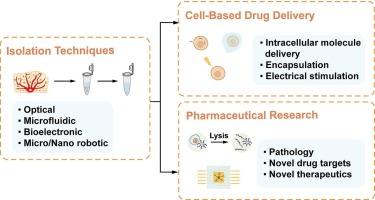Single-cell technology for cell-based drug delivery and pharmaceutical research
IF 10.5
1区 医学
Q1 CHEMISTRY, MULTIDISCIPLINARY
引用次数: 0
Abstract
Leveraging the capacity to precisely manipulate and analyze individual cells, single-cell technology has rapidly become an indispensable tool in the advancement of cell-based drug delivery systems and innovative cell therapies. This technology offers powerful means to address cellular heterogeneity and significantly enhance therapeutic efficacy. Recent breakthroughs in techniques such as single-cell electroporation, mechanical perforation, and encapsulation, particularly when integrated with microfluidics and bioelectronics, have led to remarkable improvements in drug delivery efficiency, reductions in cytotoxicity, and more precise targeting of therapeutic effects. Moreover, single-cell analyses, including advanced sequencing and high-resolution sensing, offer profound insights into complex disease mechanisms, the development of drug resistance, and the intricate processes of stem cell differentiation. This review summarizes the most significant applications of these single-cell technologies, highlighting their impact on the landscape of modern biomedicine. Furthermore, it provides a forward-looking perspective on future research directions aimed at further optimizing drug delivery strategies and enhancing therapeutic outcomes in the treatment of various diseases.


单细胞技术利用精确操作和分析单个细胞的能力,已迅速成为推进基于细胞的给药系统和创新细胞疗法不可或缺的工具。这项技术为解决细胞异质性和显著提高疗效提供了强有力的手段。单细胞电穿孔、机械穿孔和封装等技术的最新突破,特别是与微流控技术和生物电子学的结合,显著提高了给药效率,降低了细胞毒性,并实现了更精确的靶向治疗效果。此外,单细胞分析,包括先进的测序和高分辨率传感,为复杂的疾病机制、耐药性的产生以及干细胞分化的复杂过程提供了深刻的见解。本综述总结了这些单细胞技术最重要的应用,强调了它们对现代生物医学格局的影响。此外,它还从前瞻性的角度探讨了未来的研究方向,旨在进一步优化给药策略,提高治疗各种疾病的疗效。
本文章由计算机程序翻译,如有差异,请以英文原文为准。
求助全文
约1分钟内获得全文
求助全文
来源期刊

Journal of Controlled Release
医学-化学综合
CiteScore
18.50
自引率
5.60%
发文量
700
审稿时长
39 days
期刊介绍:
The Journal of Controlled Release (JCR) proudly serves as the Official Journal of the Controlled Release Society and the Japan Society of Drug Delivery System.
Dedicated to the broad field of delivery science and technology, JCR publishes high-quality research articles covering drug delivery systems and all facets of formulations. This includes the physicochemical and biological properties of drugs, design and characterization of dosage forms, release mechanisms, in vivo testing, and formulation research and development across pharmaceutical, diagnostic, agricultural, environmental, cosmetic, and food industries.
Priority is given to manuscripts that contribute to the fundamental understanding of principles or demonstrate the advantages of novel technologies in terms of safety and efficacy over current clinical standards. JCR strives to be a leading platform for advancements in delivery science and technology.
 求助内容:
求助内容: 应助结果提醒方式:
应助结果提醒方式:


